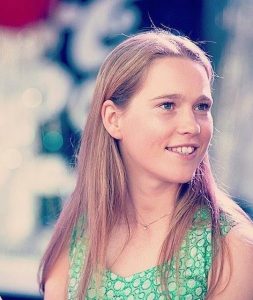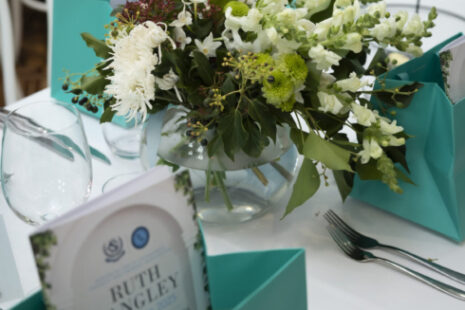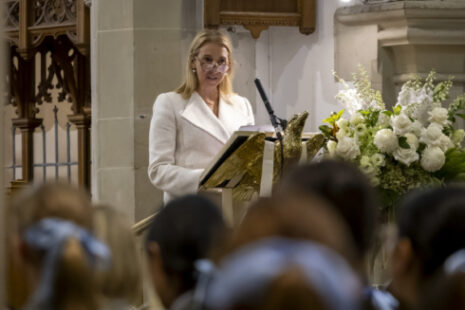Where are they now? Saskia Holloway
2013 School Dux, Saskia Holloway shares her story of how unconventional choices led to a reaffirmation of personal passion.
 What is your current position and what does it involve?
What is your current position and what does it involve?
I am currently undertaking French Honours at The University of Melbourne after graduating with a Bachelor of Arts (first class double major in Politics and Latin) and a Diploma of Languages in French. The general focus of my thesis is on the issue of linguistic politics in post colonial contexts. I am looking specifically at how indigenous languages are being revitalised and reinvigorated in popular culture through the vehicle of cinema. The proposed structure is a cross cultural analysis between select indigenous Australian and Senegalese cinematographers (a former French colony) who have opted to produce their films in language (in the indigenous language relevant to them or to their audience). I recently worked as a linguistic assistant for the Pama Language Centre in the community of Hope Vale. The centre falls under the umbrella of Cape York Partnerships, and is part of a broader scheme to assist First Nations peoples in maintaining and revitalising their languages. This experience equipped me with a deeper understanding of the initiatives that are being pursued to preserve and revitalise fragile languages across Australia (90% of indigenous languages are on the verge of extinction), and will no doubt be an incredible asset to my thesis as it evolves.
What is your career background?
I am an undergraduate student. However, I have worked throughout my degree as a Latin teacher at a primary school, and more recently as a university tutor for an ancient world studies subject. Whilst at Ormond College, I directed the ‘Case Competition’ and the ‘Pitch Project,’ initiatives which seek to engage young people in developing business style solutions to issues such as homelessness and youth unemployment. I also interned at the French Honorary Consulate as a language assistant. During the semester I have volunteered at The Huddle, an after-school tutoring program run by the North Melbourne Football Club for VCE students from refugee and migrant backgrounds. Outside the academic year, I have ventured overseas to work for Mechai Viravaidya, the former Minister for Family Planning and founder of the Population Development Association, at his Bamboo School in central Thailand.
What have been two of your greatest career achievements to date?
I am still in the studying phase of my life, and am very much focused on investing as much as possible into my thesis and Honours year. I am exploring my career options, and have facilitated this process with workplace experience. At the end of my exchange year, I worked for three months in Geneva as a research analyst for a legal NGO whose mandate was to analyse the legal framework surrounding national, international and bilateral policy making around immigration, and detention measures more specifically. My recent experience with the Pama Language Centre reflects my strong interest in indigenous affairs, and in particular, in language policy.
What challenges have you faced professionally and how have you dealt with them? Thinking about your career progression, what study did you undertake post-school and how was it beneficial?
The biggest challenge that I faced in the early years of my degree was combating often negative comments about how I was going to use my studies (particularly Latin) to prepare myself for future employment. As much as I loved studying the speeches of Cicero, and the linguistic mannerisms of roman slaves, I was also beginning to wonder the same thing. The question of applicability, and more importantly of employability, was weighing very heavily on my mind. I dealt with this problem in three ways. Firstly, I accepted the fact that I couldn’t anticipate every potential direction that my career could take, and that flexibility, although uncertain, would lead me to more rewarding results. Secondly, I made it my mission to buy coffee for as many people as I could who were willing to talk to me about how they had navigated the transition from an arts degree, to further study or directly to employment. Thirdly, I applied for a year long exchange at Sciences Po, Paris, which is one of the most highly regarded institutions in the field of political science, boasting amongst its alumni many former presidents and heads of state. In both semesters I have taken (in french) international politics units which have directly focused on contemporary issues such as migration, aid, climate change, terrorism and the changing political landscape in Europe and abroad. In the final year of my degree, I am starting to see how my subject choices are not irrelevant at all, and that they are in fact beginning to lead me in very interesting directions.
Reflecting on your time at St Catherine’s how do you feel the School/staff/students assisted you?
I look back on the time that I spent at St Catherine’s with enormous gratitude. Throughout my three years there, I always felt stimulated and inspired by the exceptional level of teaching and by the breadth of co-curricular opportunities that the School always had on offer. The importance of independent and pro-active learning that was often emphasised at School was incredibly useful in preparing me for the transition into university. I found the lack of structure especially daunting in my first semester of university, and if it wasn’t for the initiative that I had developed at School, I sense that I would have really struggled with managing, and later with directing the course of my degree.
The careers program at St Catherine’s, as well as my regular meetings with Mrs dan der Poel, helped me to narrow down my course options and to navigate the endless flow of administration. I think the emphasis that the School, and indeed the Careers department, placed on passion as a condition of success, made me realise that my career decisions had to be informed first and foremost by those things about which I was most passionate. My current circumstances are a perfect example of how this advice can materialise – three years later and I am studying politics and French in Paris, based on a decision to continue doing what I loved at School rather than going straight into a vocational degree such as Law.
What advice would you have for current St Catherine’s students, particularly our VCE students, when selecting subjects, tertiary courses and careers?
I would advise students to do as much investigative work as possible when selecting tertiary courses and institutions. This could involve talking to older friends or former students who have studied, or are currently undertaking a course that interests you. Reading course handbooks online is not enough, and doesn’t convey the lived experience of studying that particular course. I was too fixated on staying on top of my VCE course work to do enough of this, however I think it is incredibly useful to draw on other people’s insights and experience when making such important choices. In terms of career-based decisions, I would also advise students to actively seek out people who are working in the industry that sparks their interest. It is hard to gauge the variety of careers that exist when you’re still a student. However, it is worth initiating dialogue with current professionals sooner rather than later in order to understand what that particular career involves, potential avenues into that career, and other possible careers that compliment your strengths and interests. That is certainly the approach that I have adopted when considering the different paths that I could take post university.
St Catherine’s has a proud history of Old Girls influencing a number of industries. Do you have professional networks of Old Girls that you keep in contact with? If so, how have these connections been beneficial?
I attended a SCOGA Women in Law networking event in my second year of university. Following the breakfast, I contacted one of the Old Girl speakers, Kate Barber, and ended up meeting her for coffee to discuss her experience working in law and government. Her insight and suggestions definitely fuelled my interest in law and politics, and gave me plenty to reflect on when considering future career paths.





